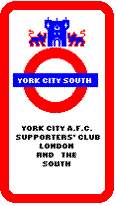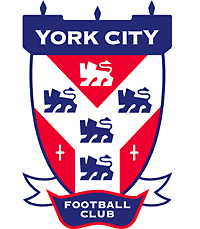



|
YORK CITY SOUTH |
City History
2009/10 Accounts
York City Wage Bill Up By £250,000
A rise in player salaries of £250,000 led to York City making losses of almost £275,000 during the 2009/10 season.
Abbreviated accounts have revealed that the Minstermen were £274,310 in the red for the year ending June 30, 2010, despite playing in the Blue Square Bet Premier play-off final at Wembley, reaching the third round of the FA Cup when Premier League Stoke City provided the opposition and selling Adam Boyes to Scunthorpe in a deal believed to be worth £50,000.
During the previous season, the club made a modest profit of approximately £30,000, having also enjoyed a money-spinning Wembley appearance in the FA Trophy final and raised another six-figure sum from the transfer of Martyn Woolford, again to Scunthorpe.
An annual turnover of £1.69 million in 2009/10 was almost identical to the campaign before, but City chairman Jason McGill has explained that the losses were due to giving former manager Martin Foyle the proceeds from the Trophy run to bolster his playing budget.
McGill added he believed that decision was justified by Foyle’s team coming within 90 minutes of winning promotion back to the Football League before succumbing to Oxford United 3-1 at the national stadium last May.
This set of figures mean, however, that since being relegated from the Football League in 2004, the club have now racked up £1.37 million in losses.
The biggest in a single season – £414,000 – came during 2007/8 after Billy McEwan had guided City to the play-offs during the previous campaign.
The 2009/10 accounts also include the respective transfer fees of £55,000 and £10,000 paid for Michael Gash and Michael Rankine, but McGill stressed that an increase in the club’s wage bill to around £1.2 million – for all staff – was the biggest reason for the six-figure losses, saying: “Despite our FA Trophy run in 2008/9, our league performance that season was poor and we saw the club flirting with relegation.
“The board decided to re-invest the money generated by the FA Trophy final to boost the playing budget, seeing this as a necessity to ensure playing success. This proved the right decision as we almost gained promotion to the Football League.
“In order to break even at York City, we would have to more than halve our playing budget. From the 2008/9 season, you can see that this reduced budget level does not give us the resources to compete in the Conference and would potentially lead to adopting part-time status.
“This is not something the board believes our supporters want and we therefore continue to operate a playing budget that has the potential of generating on-pitch success.”
The board also revealed that gate receipts rose in 2009/10 but the cost of ground repairs more than doubled to around £40,000 due to extensive work on the Main Stand roof and floodlights, while rents and rates increased too.
Back in October, the club announced that they expected to make additional operating losses of £350,000 this season although a proportion of that deficit will be offset by Richard Brodie’s six-figure sale to Crawley Town, another FA Cup third-round clash at Bolton Wanderers and a sell-on fee from Woolford’s move from Scunthorpe to Bristol City.
With Gary Mills’ team still in play-off contention going into the last month of the season, though, promotion would be worth £700,000 to the Minstermen, while a stronger commitment from City of York Council concerning the building of a new community stadium would also improve the financial outlook.
In addition to McGill’s comments, a club statement read: “The board acknowledges that losses of this level are unsustainable in the long term and this again highlights the need for the club to move to a new ground, where additional sources of income and reduced maintenance costs to an ageing stadium will assist the club in maintaining its desire for promotion back to the Football League.
“At the beginning of the current season, the board reviewed the playing budget again. They decided that, in view of the success of last season and the additional receipts from the play-off final, as well as the increased playing budgets of other Blue Square Bet Premier clubs, they would authorise a playing budget to try to achieve playing success.
“Taking this into account, the financial accounts for the year ended June 30, 2011 are expected to show a significant loss again. However, they are in line with the budget set at the start of the season and will be reviewed again during the close season to ensure that the club is operating at a level which takes into account the resources available to it.
“As the season reaches its conclusion, the directors are satisfied that the team is competitive and is in a strong position going into the final matches.” City’s first season in the Conference saw the club make an £83,000 loss, which rose to £359,000 in 2006.
Further annual losses of £270,000 and £413,000 then followed before 2009’s £30,000 profit.
This article is based on a article by Dave Flett that appeared in The (Yorkshire Evening) Press on March 30, 2011. Read It